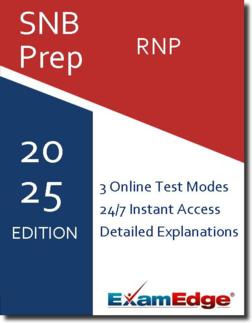SNB RNP (SNB-RNP) Practice Tests & Test Prep by Exam Edge - Test Reviews
Based on 37 Reviews
- Real Exam Simulation: Timed questions and matching content build comfort for your SNB RNP test day.
- Instant, 24/7 Access: Web-based SNB Registered Nurse (Psychiatric) (RNP) practice exams with no software needed.
- Clear Explanations: Step-by-step answers and explanations for your SNB exam to strengthen understanding.
- Boosted Confidence: Reduces anxiety and improves test-taking skills to ace your SNB Registered Nurse (Psychiatric) (RNP) (SNB-RNP).

SNB RNP (SNB-RNP) Practice Tests & Test Prep by Exam Edge - Review
SNB Registered Nurse (Psychiatric) (RNP) - Reviews
Excellent
Based on
185
reviews
See why our users from 154 countries love us for their exam prep! Including 37 reviews for the SNB RNP exam.
Exam Edge is an Industry Leader in Online Test Prep. We work with our Institutional Partners to offer a wide array of practice tests that will help you prepare for your big exam. No Matter how niche field of interest might be, were here to help you prepare for your test day.
| 2.8M | 4.5M | |
| Users | Tests Taken | |
| 100K | 19 | |
| Unique Exams | Years in Business | |


